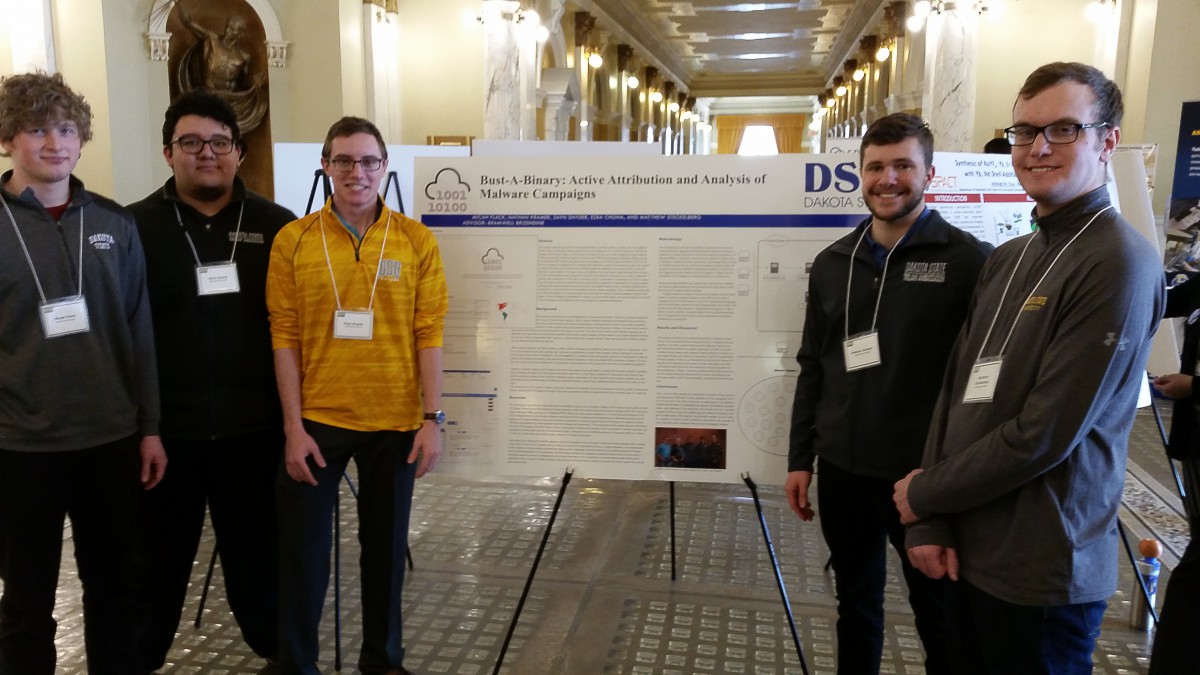Cyber Operations majors to present research to legislators
February 27, 2019
Legislators, college students, and the public can all benefit from an event being held Feb. 28 at the State Capitol Rotunda in Pierre.
Fourteen undergraduate projects will be featured at the 2019 Student Research Poster Session, which runs from 11 a.m. to 3 p.m. Thursday, Feb. 28, in the State Capitol Rotunda. One of those projects is the work of five Dakota State University cyber operations majors, who will present their cyber research project, titled “Bust-A-Binary: Active Attributions and Analysis of Malware Campaigns.”
This 22nd annual event is beneficial for legislators, demonstrating the outcomes of an enhanced research culture on the state educational system, while showing students how higher education public policy decisions are made, including those related to support for research.
Micah Flack, from Bemidji, Minn. agreed that this event will familiarize them with the legislative process, and will “show cyber research and the impact of malware campaigns and how they can affect day-to-day life.” Malware is a computer file designed to do damage to equipment and networks.
Nathan Kramer looks to the event to “strengthen our skills at communicating our technical process to non-technical people.” For example, the project uses a cyber sandbox, which Kramer explained is a safe environment where researchers can study malware. Kramer is from Sioux Falls, S.D. In addition to the legislators, the event is open to the public, and Zayn Snyder, from Pierre, S.D., hopes to explain the project to his father.
The student can also report to the legislators how the project has helped deepen their knowledge of cyber operations. Matthew Steckleberg, from Chamberlain, S.D., said he has learned additional program languages, which will be useful when he graduates and begins working in the profession.
Ezra Chona has been in contact with some industry professionals, namely Cuckoo Sandbox head developer Juriaan Bremer. Cuckoo Sandbox, a malware analysis company, is one of the tools they use for their research.
“That was one of the highlights of this entire project,” said the Rochester, N.Y. native, “being able to communicate with the head of a fairly successful company.”
The project idea came from a presentation in faculty advisor Bramwell Brizendine’s reverse engineering class, said Flack, who took the lead to continue the research outside of class. “Bust-a-Binary” will be an open-source website where people can submit files for analysis. Based on the data they receive, they will use machine learning to identify the malware and predict future trends, Flack explained. Machine learning is a method of data analysis that automates analytical model building, and Flack described it as “the next big step in data structures.”
Because of the machine learning the students are currently developing, Brizendine said, “a piece of malware that has not been detected yet can be attributed to an existing malware family.” Once that is determined and the researchers have an idea how it operates, incident responders will be better able to address the threats posed, he stated.
While it is still a work in progress, this project “will show that students at DSU are developing something potentially sophisticated that can have a strong real-world impact, that potentially could be use by individuals or organizations that wish to harden their security and identify malware.”
The students will also present their research at Dakota State’s Research Symposium, at a poster session held at the DSU Trojan Center in Madison on March 27 from 11 a.m. to 1 p.m.

